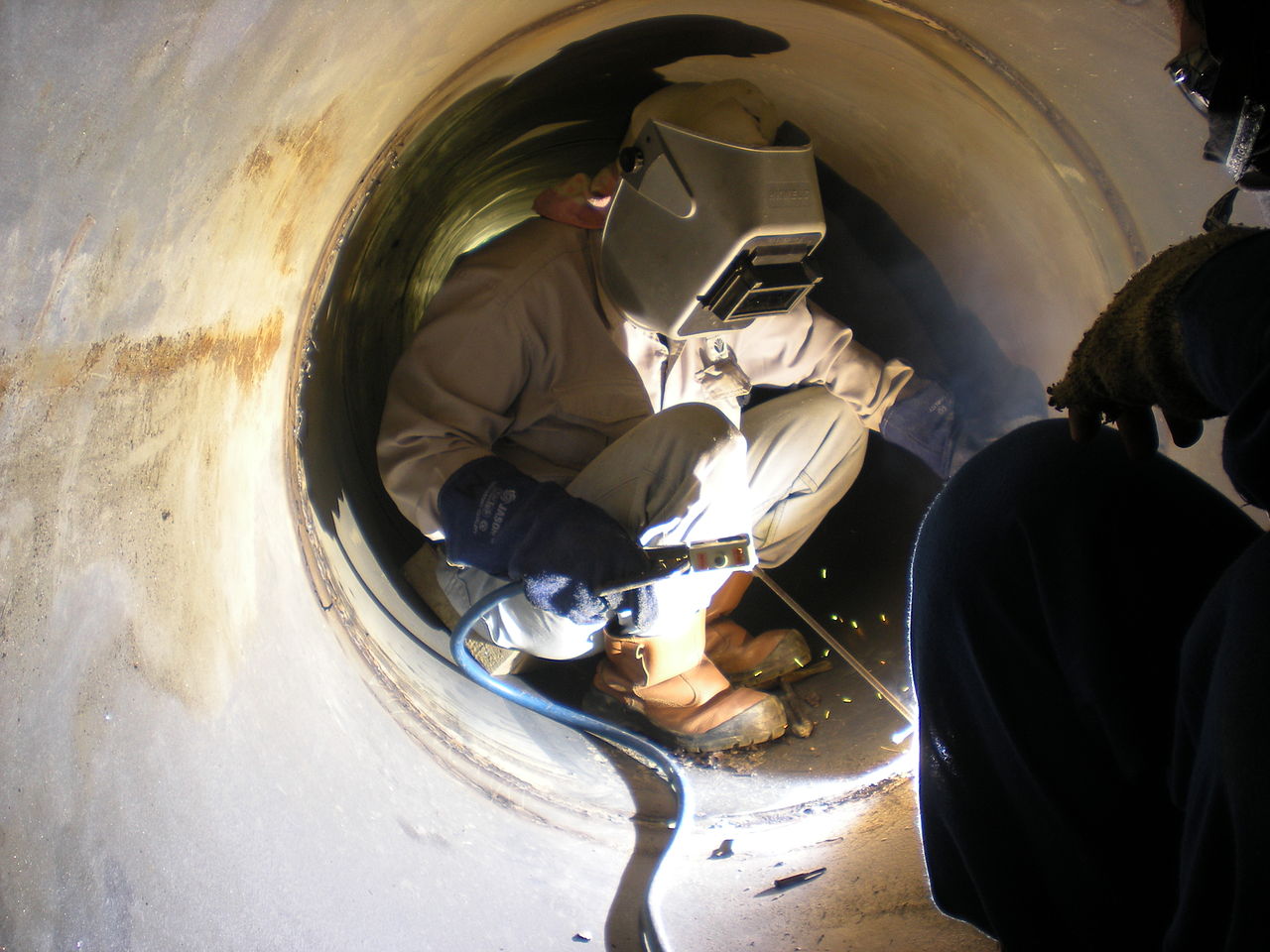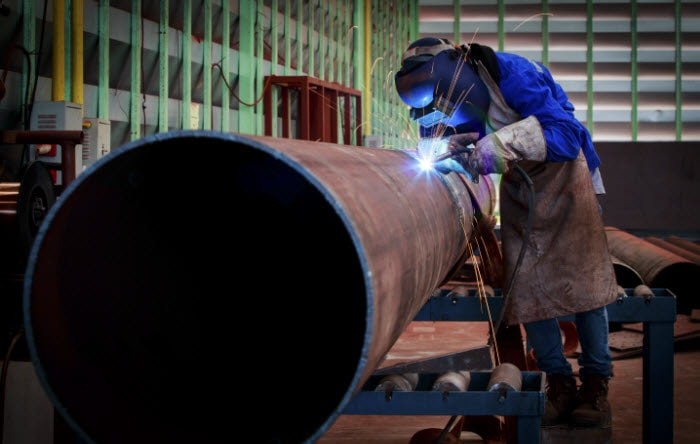
Becoming a pipeline welder takes training, skills, hard work and dedication to make it in what is a tough world.
That’s the downside.
But the upside is that there are comparatively few pipeline welders compared to the amount of work that is out there waiting to be done, and that’s good news.
So how do you get there?
Let’s have a look at what you need to do to become a pipeline welder.
Education:
You will need a High School Diploma or its equivalent along with technical hands-on training and certification in order to make it as a pipeline welder.
Math is important, as is the ability to read blueprints and mechanical drawings along with physics, chemistry, and metallurgy.
– The science of metals.
These are all important subjects for a good pipeline welder.
A fundamental understanding of and respect for electricity is vital, and of course computers.
You may be asked to use computer-driven machinery at some point.
So, make sure you excel in these subjects in school to give you the best possible shot at your new career.
There are university and college courses that will train and certify you.
So, look for a program that is specific to pipeline welding, if that’s the career path you have chosen.
The courses last between 30 to 45 weeks with classroom learning and practical hands-on training.
After that you will receive a certificate which qualifies you to be a pipeline welder.
That’s the easy part because there are few employers who will hire an inexperienced welder, preferring instead to hire experienced people who understand the job.
Fitness:
Pipeline welding can be a tough physical job and you need to be fit.
You need a high level of stamina to cope with long periods on your feet and carrying out repetitive actions while you work on a project.
You will need a steady hand for accuracy.
So, your hand-eye coordination needs to be excellent.
The work can mean working with heavy components and you will go through the whole range of movements from kneeling, stretching, bending and standing.
Then doing it over and over.
Becoming Certified:
There is a difference of opinion here between those who say it’s essential to be properly trained and certified.
Some of the older hands, who say you don’t need any of that to do the job.
The fact is that,
Most employers won’t employ you as a pipeline welder without seeing your certifications and proof that you can do the job to a high standard.
American Welding Society Certification:
The AWS offers a training and certification process with no preconditions or academic needs.
You simply book the test, turn up and undertake a demonstration job.
You will be required to read instructions and understand what you have to do, and you will be judged on the whole process including
- Fit-up
- Assembly
- Placing the work
and of course the quality of the finished weld.
Once you have completed the test, it will be evaluated by a qualified inspector and if you fail you can retake the test.
Certification for pipeline welding is a specialized certification and requires a more difficult test.
The test is strict and requires passing a visual examination of the weld for how it looks as well as its precision.
The test piece will be checked by X-Ray to assess the strength of the weld and candidates will also be assessed on their technique.
How they work, the positioning and welding of the test piece in the set-up which is determined by the inspector.
How to Get a Job?
It is tough to get a job when you have little experience.
It’s the old story that you need experience to get a job, but you can’t get experience without one.
So, what do you do?
Some companies will take you on as an apprentice and that will take five years to complete but at the end, you will be fully experienced and qualified.
They may also pay for training but to be honest those positions are few and far between.
If you can get an experienced pipeline welder to take you under his wing and train you, then that would be ideal.
But again it’s rare.
Welder’s Helper – A Way In:
One option is to start as a welder’s helper and learn the job from the ground up.
You will get the opportunity to work with someone who is experienced and knows the business and if you are keen and dedicated you will get there.
Your job as a helper is to do everything in your power to make the welder’s job easier.
As a welder’s helper on pipeline projects, you will need transport to get you to from work and some cash in the bank to cover living expenses until you start to earn.
You will usually be expected to supply most of your own kit, like Personal Protective Equipment (PPE) and clothing, steel-capped boots, gloves, fire-rated outerwear, safety glasses and masks, and a hard hat.
Sometimes this equipment will be supplied, but if you have your own, it will show willingness to be prepared for anything and that you are keen.
Ask any pipeline welder who has been in the job for a while.
They will tell you the ones who make it are those who are prepared to learn and work hard and practice harder, to build their skills and experience.
They are the ones that will succeed.
The conditions will often be harsh – really hot or cold, wet and miserable, but the job has to be done.
So, if you are of a mind to be a moaner you won’t last very long.
It is a hard industry but with it come real rewards for those that stick it out.
How much do pipeline welders make?
This question is similar to “how long is a piece of string”.
There is no correct answer.
Mainly because, it depends on so many different factors like age, experience, skills, location and even within pipe welding – the specific industry – gas, oil, water, and underwater are have different pay rates.
Let’s try to work through it to give you an approximate guide as to what you might expect to be paid in this skilled job.
What are Your Expectations?
It’s difficult not to use ‘averages’.
But unfortunately,
Those are what we have because of the wide spectrum of factors involved.
So, the averages for pipeline welders in the U.S. are between $42000 and $300,000 per year.
So, you can see how wide a range that is.
The question is, how can I get into the $300,000 earning area?
It’s simple, join the élite class of 6G certified welders, the crème de la crème of the welding industry.
And you will earn huge money - guaranteed.
Better Pay Levels for Higher Certification:
Welders gain certification at various levels starting at 1G (flat welding) through to 6G.
Which is an open joint between two pieces of pipe mounted in a fixed position at 450 degree.
Less than 5% of welders are certified 6G and because there are so few of them, they can earn the most money.
These are the guys who will earn between $200,000 to $350,000 a year with their own ‘rig’ and often an RV trailer in tow.
They are completely self-sufficient and can and do, go anywhere the work is and they will never be out of work.
All you need to do is learn the skills then keep practicing them over and over until you are expert but remember not everyone can do it.
As you know anything worth having is never easy.
So, What Can You Expect To Earn as a Pipe Welder?
The average hourly rate for a welder is $24.39 and of course, those with experience can earn upwards of $40.00 an hour.
Those starting out will be offered considerably less.
The average qualified experienced welder will earn around US$42,500 per year but for pipeline welders, who are prepared to travel can earn around US$65,000 and in the gas industry around US$72,000.
Usually, these welders are hired as contractors and have to supply their own accommodation, but they get paid a tax-free living allowance for each 6 days out of 7.
Plus, they can rack up overtime, bonuses and profit shares on some contracts, which will boost their income substantially.
According to the US Bureau of Labor Statistics, the need for welders is expected to increase by 21% up to 2022 and that’s more than the average for all other occupations.
We mentioned welder’s helpers as a possible way to become a qualified pipeline welder and you would be joining an industry with excellent job growth prospects.
Helper salaries generally depend on the field in which they work and the geographic location.
The national average salary for a Pipeline Welder Helper in the U.S. is $32,459.
It’s worth considering, to enable you to get on the inside track in your chosen career.
The Takeaway:
If you are willing to train and get certified as a pipeline welder and get into the industry as a welder’s helper that’s when your training starts.
If you get that opportunity, it’s then up to you what you do with it.
Grab it and go for it and in a few short years, you will have gained the experience and skills and the potential to earn big money in your new career as a pipeline welder.

